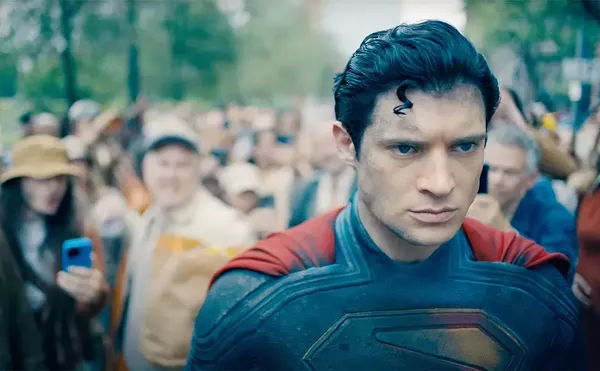
Audio By Carbonatix
[
{
"name": "GPT - Leaderboard - Inline - Content",
"component": "35519556",
"insertPoint": "5th",
"startingPoint": "3",
"requiredCountToDisplay": "3",
"maxInsertions": 100,
"adList": [
{
"adPreset": "LeaderboardInline"
}
]
}
]
The Edge sits calmly in an armchair on a soundstage in Los Angeles as the cameras roll for Davis Guggenheim's new documentary It Might Get Loud. Much of the movie to this point has focused on the buildup to a live-in-person "summit" featuring the U2 guitarist and two other rock-guitar icons of their respective eras, the White Stripes' Jack White and Led Zeppelin's Jimmy Page, but so far Guggenheim hasn't gotten much for his trouble except for the polite, slightly uncomfortable chit-chat of strangers. And then Page, sitting in an armchair across from the Edge, picks up his guitar and digs into the grinding riff that opens Zeppelin's "Whole Lotta Love," and the Edge stands up, seemingly unconsciously, galvanized, as if Page has just started banging out the national anthem, or maybe the secret sequence of his DNA. The mysterious connection between man, instrument and the sound they make together manifests itself in that unbidden reaction better than anything else Guggenheim captures in his movie on the subject, and it's no surprise that it comes at the hand of Page, a rock god if there ever was such a thing and the not-so-secret star of the show.
Guggenheim won an Oscar for making global warming — and Al Gore — compelling onscreen in An Inconvenient Truth, and has turned his talents toward another big, potentially unwieldy subject: said mysterious connection, as embodied in the lives and work of the three musicians. The director clearly went to lengths to avoid most of the standard rock-flick tropes — there are no talking heads other than the participants and no prurient Behind the Music rise-and-fall arcs. Instead, for example, Guggenheim films White teaching a black-suited stand-in for his own 9-year-old self how to play guitar. He takes the Edge back to Mount Temple, the Dublin secondary school where U2 formed, and films Page wandering the halls of Headley Grange, the estate where Zeppelin created iconic albums such as Led Zeppelin IV and Physical Graffiti. While the aforementioned chat session and guitar-pull functions as the movie's organizational and thematic center, it's not hearing the three play U2's "I Will Follow" together that appeals as much as watching the Edge and White teaching the dog-simple riff to a pursed-lipped Page. The men and their stories, as told here, compel more than the music.
The mysterious connection remains mysterious, for the most part, but if you're content to simply nerd-out hard over the portraits that emerge from Guggenheim's extraordinary access, then you're in luck. White's 19th-century-undertaker affect and laborious atavism are cut by a ferocious work ethic and undeniable passion: at one point he talks about his teenage bedroom, which was so crammed with musical instruments and equipment that he moved his bed out and slept on the floor. White's intensity is cut, in turn, by the Edge, who comes off as an appealingly humble, dry-witted mensch, never without his trademark skull cap or a wry grin. He pokes fun at his trademark ringing arpeggios (heard without his cabinets full of effects and amplification, they aren't quite as, um, anthemic) but also makes clear that they've been a lifelong obsession; one sequence finds him in his childhood home, listening to early cassette tapes of his defining sound, already there in skeletal form. Most of all, he lends Loud a lightness that it would otherwise miss.
And then there's Jimmy Page. White and the Edge may be rock stars, but not like Page is. They drive; he is chauffeured. They each have trademark garb; he wears a long black coat and a white shirt with ruffled cuffs like a standard going-down-the-pub ensemble. Silver-haired, trim, and remarkably unlined, he retains an air of hooded inscrutability even when it seems he's sincerely trying to address the movie's open-ended queries about the power of music as delivered by string, wood, and amplification. Then, Guggenheim's cameras catch him in his music room, flipping through old 45s until he finds the one he's looking for: Link Wray's seminal 1958 instrumental "Rumble," the ur-text for all loud, rude guitar. As Wray's riff staggers along, Page's head goes back, he breaks into a Buddha smile, and he plays a little air guitar. It gets to him too.
Opens Friday at the Main Art Theatre, 118 N. Main, Royal Oak, 248-263-2111.
Lee Gardner is the editor of Baltimore’s City Paper. Send comments to letters@metrotimes.com.





